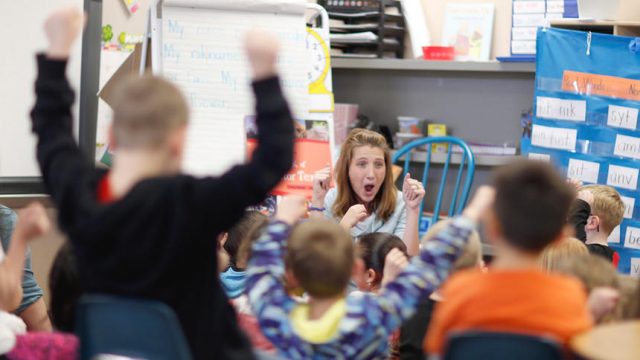Rep. Scott Louser: Time for the State to Take Over K-12 Spending to Eliminate Local Property Tax Burdens

Wilder Elementary kindergarten teacher Cassie Riewer and her students share some enthusiam Monday. photo by Eric Hylden/Grand Forks Herald
Property taxes are consistently at the top of the list of voter concerns every election cycle and as the calendar year draws to a close, property owners will be anticipating their annual bill.
While the legislature does not assess property, levy the mills, collect the taxes or spend the revenue, we are involved in the property tax in the form of buy downs and education spending.
Property tax reform is necessary and while no proposal is perfect, here is a summary of a bill draft I’ll be proposing next session.
The concept is that the legislature would provide 100% of K-12 funding based on the education budgets of public schools in the previous year. Currently, the state funds approximately 82% of K-12 education. As the state takes responsibility for education funding, the mills for education would be eliminated at the local level.
[mks_pullquote align=”right” width=”300″ size=”24″ bg_color=”#ffffff” txt_color=”#000000″]The concept is that the legislature would provide 100% of K-12 funding based on the education budgets of public schools in the previous year.[/mks_pullquote]
In exchange for this increased funding, the twelve percent buy down being provided to the cities, counties and park boards would be eliminated. Further, the bill draft proposes something not done in North Dakota previously. For a local school district that wants to propose a bond for construction of a new building, the bond would be funded through a special assessment, not a mill levy.
The special assessment would be a specific dollar amount for a defined number of years and would apply evenly to all residential property, regardless of the valuation of the home. The theory of not placing the assessment on commercial property is that commercial owners presumably have a separate residential property and a vote to tax themselves for a school building.
Assisted living, nursing facilities and retirement homes would be exempt.
For multi family properties, the defined special assessment would apply for every four units. A 16-plex would receive four assessments while a tri-plex would receive one.
Any school district that is currently levying mills to pay off a bond for building would be made whole until the bond is paid, eliminating that amount of funding from the state the following year.
By introducing this concept prior to the session, we can evaluate the fiscal note with scrutiny as well as determine if the local property owner’s tax bill will see a substantial and sustained reduction. The intent of this legislation is to reduce property taxes and to make them truly local without buy downs that may not be passed to the tax payer.
Also, it fulfills the concept of the state providing education per the Constitution. It creates a more balanced vote for the citizens upon a bond proposal. It takes the state out of the property tax game and allows the legislature to focus on K-12 funding.
Finally, for we legislators who campaign on education as a top priority, this proposal would all but force the House and Senate to truly make education a top issue each and every session.




